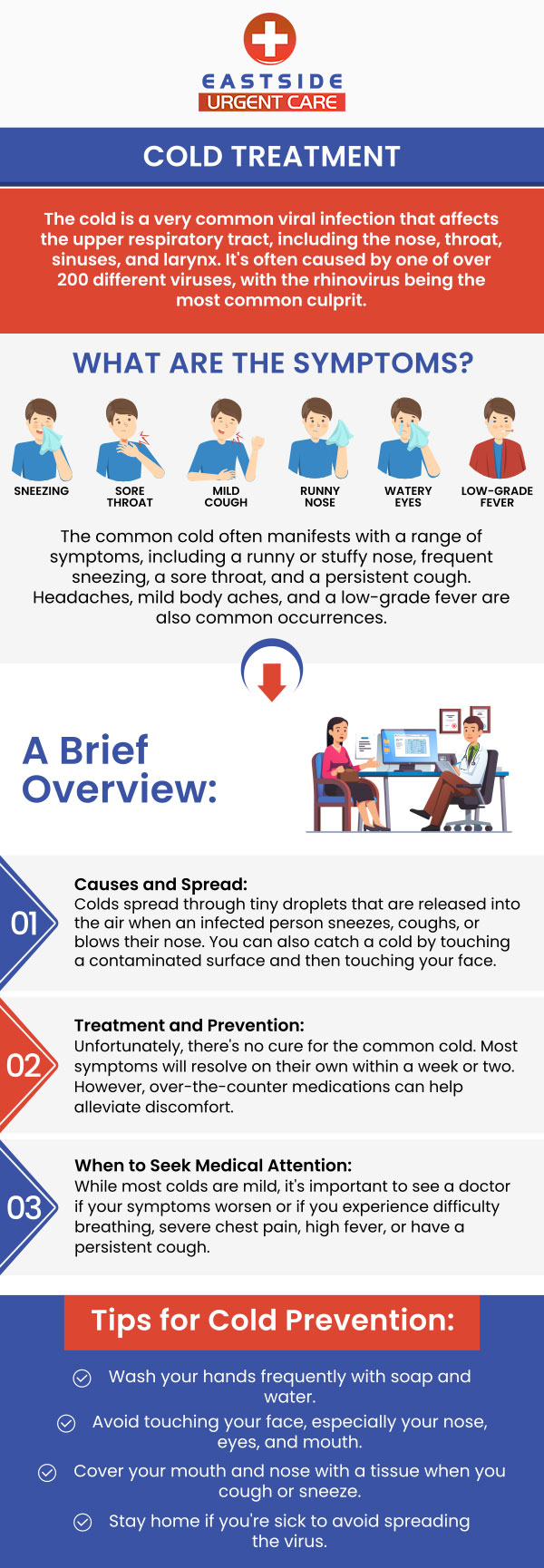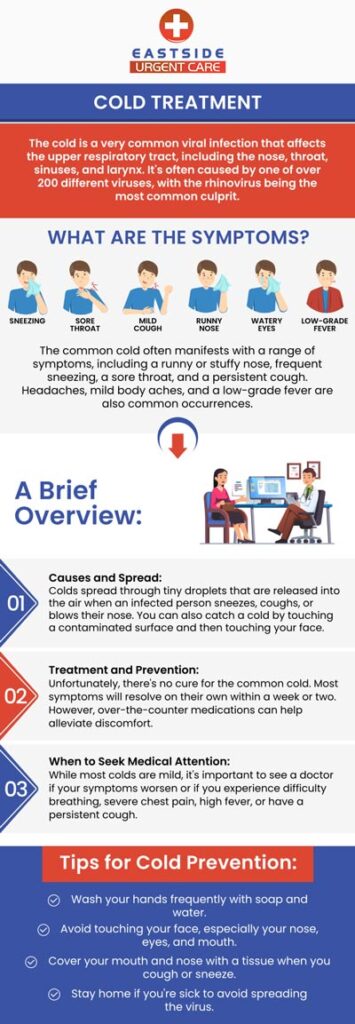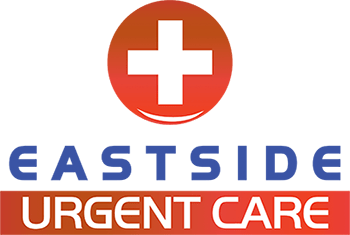Does Blowing Your Nose Make Cold Symptoms Worse?
At EastSide Urgent Care in Cincinnati OH, we offer a range of STD tests to help detect and manage various diseases. Consult our professionals to learn about the different types of tests available and the importance of early detection for maintaining your health. For more information, contact us or book a same-day priority appointment. We are conveniently located at 872 Ohio Pike Cincinnati, OH 45245.


Table of Contents:
Why Is My Cold Getting Worse After 3 Days?
Is It Good to Keep Blowing Your Nose With a Cold?
What Are Signs Your Cold Is Getting Better?
When Should I Go to Urgent Care for a Cold?
At Eastside Urgent Care, we understand that a common cold, though typically mild, can cause discomfort and disrupt your daily life. A cold is viral infection that primarily affects the upper respiratory tract, including the nose, throat, and sinuses, and is often spread through respiratory droplets when an infected person coughs or sneezes.
Colds typically follow a predictable progression. During days 1-3, symptoms begin mildly with a runny nose, sneezing, and a scratchy throat, sometimes accompanied by mild fever or body aches. By days 4-6, symptoms peak with nasal congestion, breathing difficulties, and the onset of a cough, which may become productive. Days 7-10 usually show improvement, with nasal discharge thickening and a persistent cough.
Worsening symptoms after three days may indicate complications. Common reasons include secondary bacterial infections, such as sinusitis or bronchitis, marked by high fever, sinus pain, and yellow-green mucus, requiring medical evaluation. Prolonged viral infections or inflammatory responses can intensify symptoms. Underlying conditions like allergic reactions, asthma, or weakened immunity may also prolong or worsen colds. Environmental factors, such as smoke or irritants, along with inadequate rest or hydration, can exacerbate symptoms. Ineffective use of over-the-counter medications may further contribute to worsening conditions.
Seek medical attention at Eastside Urgent Care if you experience persistent high fever, breathing difficulties, chest pain, bloody nasal discharge, severe headache, confusion, or persistent vomiting. For prevention, we advise frequent handwashing, covering your nose and mouth when sneezing or coughing, and avoiding close contact with infected individuals. Prompt care ensures effective management and recovery.
Treatment for a common cold is primarily supportive, focusing on symptom relief and promoting recovery. Our team can provide guidance on rest, fluid intake, and the appropriate use of over-the-counter medications for pain relief, fever reduction, and nasal decongestion to help alleviate your symptoms.
At Eastside Urgent Care, we understand how uncomfortable dealing with a cold can be. Common symptoms, such as a runny or stuffy nose, often prompt individuals to blow their noses for relief. While this can help, it’s essential to be mindful of how frequently and forcefully you do it, as excessive nose-blowing may have negative effects.
At Eastside Urgent Care, we offer guidance on managing cold symptoms effectively. Blowing your nose can help clear mucus and improve airflow, but excessive or forceful blowing may irritate nasal tissues, increase sinus pressure, and even cause nosebleeds or ear pain. To minimize risks, blow gently, alternate nostrils, use soft tissues, and keep nasal passages moisturized with saline sprays or humidifiers. Limit nose blowing to avoid irritation. Additionally, staying hydrated helps thin mucus for easier expulsion, and getting plenty of rest supports your immune system. Follow these tips to manage cold symptoms safely and enhance your recovery process.
At Eastside Urgent Care, we understand how important it is for you to feel better and get back to your daily routine. Recognizing the signs that your cold is improving can provide reassurance that you’re on the path to recovery. Here are some common indicators that your body is healing:
Signs that your body is healing from a cold include reduced nasal congestion, with clearer and thinner discharge transitioning from yellow or green to a watery consistency, making breathing easier. A diminishing cough is another key indicator, often shifting from a dry, irritating cough to a more productive one as respiratory irritation subsides. Sore throat pain and scratchiness gradually decrease, allowing for more comfortable swallowing and speaking.
Fewer aches and pains, such as headaches and muscle soreness, often accompany a return to normal body temperature and reduced fever, signaling your immune system’s progress. Improved energy levels and less fatigue is a positive sign of recovery, as is better sleep, with fewer interruptions and greater restfulness. As congestion and sore throat symptoms ease, appetite typically returns, helping restore energy. Sneezing becomes less frequent, indicating your body no longer needs to expel as many irritants. Mental clarity and focus improve as the “cold fog” lifts.
A general sense of well-being and the ability to resume regular activities without feeling drained confirm that your body is overcoming the infection. These indicators collectively highlight your progress toward full recovery and a return to normal health. At Eastside Urgent Care, we recommend continuing to rest and take care of yourself to support your full recovery. Recovery can vary from person to person; some may experience rapid improvement, while others may take longer.
We understand that while most colds are mild and manageable at home with rest and over-the-counter treatments, certain symptoms require prompt medical attention to prevent further complications.
You should consider visiting Eastside Urgent Care if you experience persistent or worsening symptoms. A fever lasting more than three days or exceeding 101.3°F (38.5°C) could indicate a more serious infection, such as influenza. A cough producing thick, discolored mucus or lasting unusually long also warrants medical evaluation. Severe sore throats that hinder swallowing or come with swollen glands or a rash may signal strep throat, requiring antibiotics. Persistent ear pain or drainage could indicate an ear infection, and chest symptoms like pain, shortness of breath, or wheezing may point to conditions like bronchitis or pneumonia.
Complications such as sinus infections, facial pain, nasal congestion, and thick discharge, may need antibiotics. Pneumonia, indicated by symptoms like fever, chills, cough, and chest pain, requires immediate medical attention. Persistent cough, chest tightness, and shortness of breath may be signs of bronchitis that also need evaluation.
If you have pre-existing conditions like asthma, diabetes, heart disease, chronic lung disease, or a weakened immune system, a cold can worsen these issues. Our experienced team provides prompt evaluation and treatment to address these concerns, ensuring your health and well-being are prioritized.
Other Considerations:
● Seek urgent care if you experience confusion, persistent vomiting, or dehydration, to prevent further health complications.
● Trust your instincts. If something feels seriously wrong, consult our healthcare professionals.
● If uncertain about the severity of your symptoms, it’s always best to seek medical advice rather than wait until symptoms become critical.
At Eastside Urgent Care, we are dedicated to providing you with timely and effective care to ensure your health and well-being. Don’t hesitate to visit us if you’re experiencing any of these symptoms.
Protect your health with fast and confidential STD testing at EastSide Urgent Care in Cincinnati, OH. Our experienced team provides personalized care and guidance to help you stay informed and proactive about your well-being. For more information, contact us or book a same-day priority appointment. We are conveniently located at 872 Ohio Pike Cincinnati, OH 45245. We serve patients from Cincinnati OH, Covedale OH, Delhi OH, St Bernard OH, Wilders KY, and Elmwood Place OH.

Additional Services You May Need
▸ Asthma
▸ Bronchitis
▸ DOT Physical
▸ Employment Drug Screen
▸ Illness
▸ Injury
▸ Insect and Animal Bites
▸ Occupational Medicine
▸ Pediatric Visit
▸ Pre-OP Physical
▸ School & Sports Physicals
▸ STD And Treatment
▸ Rash/Allergic Reaction
▸ Stomach Flu Treatment

Additional Services You May Need
▸ Asthma
▸ Bronchitis
▸ DOT Physical
▸ Employment Drug Screen
▸ Illness
▸ Injury
▸ Insect and Animal Bites
▸ Occupational Medicine
▸ Pediatric Visit
▸ Pre-OP Physical
▸ School & Sports Physicals
▸ STD And Treatment
▸ Rash/Allergic Reaction
▸ Stomach Flu Treatment



